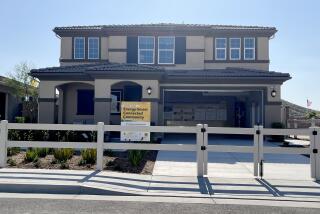‘Smart’ Appliances to Usher in Jetsons-Like Households
- Share via
STOCKHOLM — You’re just pulling into the parking lot at work when your mind’s eye suddenly focuses on a burning orange light on your kitchen counter. You’ve forgotten to turn off the coffee maker again and will be greeted tonight by the acrid smell of incinerated java.
Or maybe you left the iron plugged in or an upstairs window open, inviting fire or burglary unless you rush home.
But within a few months, homeowners in Europe and North America will be able to run their households and fix their oversights by remote control. With the new “smart” appliances being introduced by companies such as Sweden’s Electrolux and Germany’s Bosch-Siemens and home networking systems by the world’s leading technology firms, cooking, cleaning, home climate control and security can be accomplished with the touch of a telephone button.
The recent breakthroughs in Europe, as well as in Japan and North America, bring to life the fully automated household of the Jetsons, the 1960s space-age cartoon family. Homes can be vacuumed without a human present. Refrigerators can tell the cook what recipes would make best use of the foods stored inside. And family members can communicate with each other via e-mail projected on monitors mounted on the door of an appliance.
“This is all existing technology. It’s just a matter of doing it,” says Adam Fjaestad, new-product concept manager for Electrolux, as he demonstrates the company’s prototype ScreenFridge that developers expect to have on the market by the middle of the year.
The refrigerator serves as the control center for household management, as the flat computer monitor affixed to its door is the interface between appliances and equipment inside the home and such external services as utilities and the Internet. From the computer screen or a wireless handset, a homemaker can send a message to turn off power to the outlet where the iron was left plugged in and steaming. The furnace, lawn sprinklers or oven can be turned on or off from afar, conserving resources.
The ScreenFridge scans groceries as they are placed inside, taking note of the freshness dates recorded in bar codes or microchips and advising the homemaker which shelf has the most suitable temperature for each product.
Computer Suggests Menus, Orders Food
If a tired cook wants to know what to make for dinner with minimal fuss, the computer reviews food items on hand, combs through recipes in its memory and proposes menus. It also can work up a shopping list for missing ingredients, order them by e-mail from the nearest supermarket, give instructions for delivery and payment, run a video demonstration of how to prepare the dish and even recommend a wine.
Ten grocery chains here in the Stockholm area already are providing delivery-on-demand for e-mail customers, and those services are expected to broaden rapidly once the ScreenFridge is on the market, Fjaestad says.
Split-screen functions on the refrigerator’s door also allow simultaneous monitoring of in-home cameras, to keep an eye on a sleeping baby, see who’s ringing the doorbell or watch children splashing in the pool outside. The monitor can be linked with cable television or a VCR to provide entertainment for the cook.
Though the refrigerator has long been the site of the family’s bulletin board, the ScreenFridge moves domestic communications into a new age with personalized icons for each household member that can be touched to retrieve a message. “Don’t forget to do your homework before going to Jill’s for dinner,” a role-playing mom tells her virtual daughter in a demonstration.
Frigidaire of Augusta, Ga., and Panasonic of Japan also are preparing to compete for the smart-fridge market, says Tim Bajarin, president and chief analyst at Creative Strategies in San Jose. But he says the Frigidaire model is less sophisticated than its foreign rivals.
“In Europe and Japan, development labs tend to be more creative. They’ll go out and glean ideas from everywhere and integrate concepts into their products,” Bajarin says.
Another smart appliance Electrolux expects to have on the market within a few months is the Trilobite vacuum cleaner, named after a prehistoric creature. The appliance can be programmed--or commanded by telephone or the home computer--to leave a closet and cover an open floor area without a human on hand. The unit senses obstacles and operates around them.
General Electric is known to be working on speech-recognition appliances, dubbed by its developers “The Jetson Project.” But Bajarin says the U.S. company has been “very tight-lipped” about its new concepts, which are likely to take several years to reach the market because the processing power needed for speech recognition is now too expensive.
The world’s first known “household of the future” went into operation in October in the north London suburb of Watford, a joint venture between San Jose-based Cisco Systems and Laing Homes of Britain. A variety of European and U.S. firms provided the appliances and equipment.
The five-bedroom brick home that sold for about $820,000 needed only a few hundred dollars worth of special wiring to be made e-friendly, says Phil Smith, Cisco’s business development director for Britain.
“We wanted to illustrate in an active way how it would work in a real home environment--a test of the practicalities” of a fully networked household, Smith says. “We deliberately constructed a home based on existing equipment, not what could be around in five years but stuff you can get off the shelf today.”
Electrolux--which joined forces in October with the Swedish technology giant Ericsson in a joint venture committed to creating smart households for the masses--expects 20 million homes in Europe and North America to be networked by 2005, says Per Grunewald, from the appliance maker’s new and future business unit. Electrolux, which introduced the modern refrigerator 75 years ago and is the world’s biggest seller at 10 million a year, hopes the partnership will supply at least 20% of the demand for networked homes.
“We are an industry that has already created a lot of time,” Grunewald says. “Refrigerators meant people didn’t have to shop every day. Microwave ovens have cut the time it takes to cook a meal, dishwashers save cleanup time, and laundry machines mean you don’t have to go to a laundromat or down to the river as people did 200 years ago.”
Like the other industry officials, he declines to estimate what it may cost to network a household and supply it with the most modern appliances. Running advertisements on the control panel’s monitor might lower the cost to consumers, he says of the ScreenFridge.
Another player on the networking scene is BSH, a joint venture between Germany’s Bosch and Siemens companies, together with computer hardware and software developer Sun Microsystems Inc. of Palo Alto. The Munich-based German partners unveiled concepts for home automation at the Domotechnica trade fair in Berlin two years ago and believe that the deal signed with Sun Microsystems last fall secures them a foothold in a market expected to grow dramatically, BSH spokeswoman Arantxa Doerrie says.
Companies Plan to Vie for Business
Microsoft Corp. also has launched a project to apply its software to household management, and European appliance makers such as France’s Moulinex and Italy’s Candy and Merloni companies are expected to bring their own smart households on the market at the next Domotechnica exhibit in November, fair project manager Sven Prueser says.
While new partnerships and mergers are expected as the appliance and technology industries collaborate to develop smart households, some market analysts warn that consumers might not want as much direction in home management as computers are capable of giving them.
Constant reminders that the trash bins need emptying or the litter box cleaning or that light bulbs need to be changed “could create a backlash of consumers ripping out their home networks,” says Bruce Kasrel of Forrester Research, a market analysis firm in Cambridge, Mass.
Kasrel also worries that the fully automated home runs the risk of creating a society of “house potatoes” who will no longer be challenged to go out into the world for food, work, communication or entertainment.
More to Read
Inside the business of entertainment
The Wide Shot brings you news, analysis and insights on everything from streaming wars to production — and what it all means for the future.
You may occasionally receive promotional content from the Los Angeles Times.











